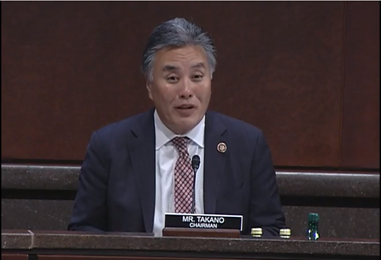Chairman Takano: “Social media platforms need to do more to eliminate internet spoofing”
Press Contact
Contact
Jenni Geurink (202-225-9756)
Miguel R. Salazar
WASHINGTON, D.C. – Today, House Committee on Veterans’ Affairs Chairman Mark Takano (CA-41) addressed the issue of internet spoofing at the full committee investigative hearing entitled “Hijacking Our Heroes: Exploiting Veterans Through Disinformation on Social Media.” Here is a video of Chairman Takano’s opening statement, and his remarks as prepared are below.
Chairman Takano’s remarks as prepared:
Today’s investigative hearing is entitled “Hijacking Our Heroes: Exploiting Veterans through Disinformation on Social Media.”
Over the past three years, there has been an increasing awareness of how foreign actors have sought to infiltrate and influence our elections. Manipulation of social media networks, a major source of news and information, has become a tool of influence. We are here today to consider how such foreign actors specifically target and take advantage of our veterans and Veteran Service Organizations on social media.
During today’s hearing, we will hear about “internet spoofing.” Spoofing is the act of disguising an electronic communication, such as email and texts, from an unknown source, and make the communication look like it is from a known, trusted source. This can happen either by creating a fraudulent account, or by stealing a real account and is one of the primary tactics by which foreign actors infiltrate social media networks.
Spoofing includes the creation of fake social media accounts using a stolen photograph or name, thereby imitating an actual person in order to gain trust and credibility. In other words, someone may be looking at what they believe is a legitimate Veterans Service Organization’s Facebook page or Twitter feed, when, in reality, a bad or fraudulent actor is masquerading as the real thing.
Social media platforms like Facebook and Twitter have enormous reach through their millions of daily users. The steady growth of internet access and mobile technology has made social media accessible to most people around the world. However, that also means that dishonest individuals or even entities associated with foreign governments can now easily reach into unsuspecting American homes to spread disinformation.
As a recent Senate Intelligence Committee report detailed, Russian efforts to infiltrate our social media networks actually increased in the aftermath of the 2016 election and are likely to continue to increase through 2020.
Let me be clear: this issue has nothing to do with censoring certain political views, or removing content based on partisan bias – this is about IMPERSONATION and stealing veteran’s voices. Pretending to be a veteran, for any reason, is shameful – but it is especially so when such deception is used to spread disinformation.
Veterans wield considerable influence and credibility in their communities, earned by virtue of their selfless service to our country. Whether in Riverside, California or Washington, DC, veterans are listened to because of their experience and sacrifice.
But that esteemed trust in our veterans is now being hijacked by foreign imposters online and used to spread harmful disinformation, political propaganda, and fake news. Foreign actors are stealing veterans’ voices and images in order to influence political opinions heading into an election year. Unsuspecting citizens could have their political judgments swayed by foreign voices posing as American veterans. By impersonating veterans, these foreign actors are effectively eroding the hard-earned power and integrity of veterans’ voices.
Social media platforms play an important role in public discourse and I continue to believe in protecting our freedoms of speech and innovation. But there is a very real, and growing, problem here – and we need to determine how to strike the balance between shielding platforms from frivolous lawsuits and ensuring election security and the sanctity of our veterans’ voices in civic discourse. The platforms themselves need to do MORE to eliminate the issue of internet spoofing, and if they don’t, then Congress will need to step in more directly.
Today we will hear from, Kristofer Goldsmith, representing the Vietnam Veterans of America. In fact, their organization itself was spoofed, leading Mr. Goldsmith to conduct years of research into how veterans are targeted by foreign actors online. We will also hear about the magnitude and scope of the spoofing problem from a data scientist from Graphika, a firm specializing in the analysis of social media networks, who has completed extensive research examining this issue.
Finally, two of the most significant social media platforms – Facebook and Twitter – will tell us about their efforts to combat the growing problem of foreign actors spoofing on their networks.
The hearing will explore some key questions.
First, how extensive is the problem of veterans spoofing? What are the types of manipulation, and how are veterans affected?
Second, are social media platforms doing enough to detect and remove bad actors? What more can the platforms do to prevent this manipulation, especially given the impending 2020 election?
Finally, what role should the government have in ensuring that veterans and others are not harmed by the manipulation of social media networks?
Are the FBI and others in the law enforcement community performing a strong and appropriate role in ensuring that our nation’s laws are followed?
The issue of protecting our elections from foreign influence is one of critical importance to all Americans – preserving the power of veterans’ voices should be of equal concern to us all.
Next Article Previous Article

